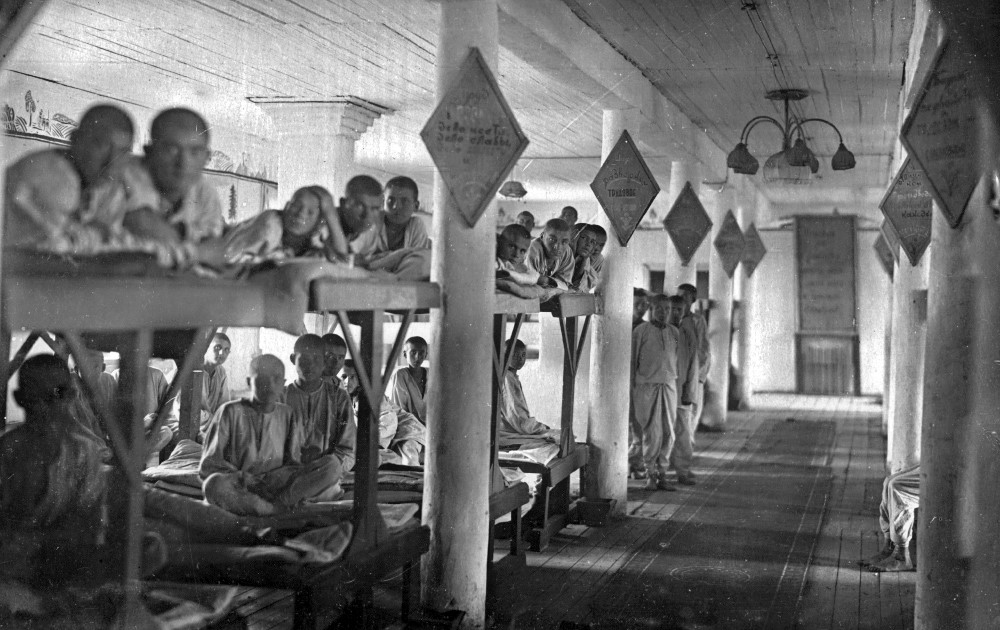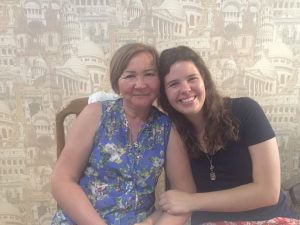Professor (and Interim Department Chair): Angela Brintlinger

My feet in St. Petersburg, in June. I was attending the 80th birthday celebration of my mentor Sergei Fomichev at the Pushkin House (Institute of Russian Literature of the Russian Academy of Sciences)
After twenty three years at Ohio State, you would think that I might be bored … or that I might have been to at least one sporting event. But neither is true. And even though I can’t tell you the names of any of Ohio State’s star athletes, I can say with confidence that I am still thrilled to be employed by the OSU Slavic Department. The Thompson Library is my favorite place on campus, though my office is a close second – surrounded by my books and papers and with access to the internet, and always a chance that a student will stop by, I am happier than I should be. Over the years I have taught over thirty different courses on all levels, from introductory classes to graduate seminars, mostly Russian literature and culture, but focused on topics from war to madness, poetry to prose, and even Polish drama. There is nothing so exciting as creating a new syllabus, unless it’s watching a student fall in love with Russia, with its literature, culture, and language. Usually I try to entice a few students from my Gen Ed courses to enroll in Russian language, and I feel quietly proud when they decide to major or minor in Russian.
I often say that I have the perfect job: I get paid to read books and talk about them. I also love to write, and I pride myself not just on my scholarship itself, but also on my style. The best compliments are when people tell me that they enjoyed reading something I wrote because they noticed that I have crafted my text with care. Writing articles and books, but also letters of recommendation, syllabi, proposals, conference programs, manuscript and book reviews, and even blog posts – this is what I do, and what I love. I can’t imagine how many words I have already produced, and I hope I have another two decades of work ahead of me.

Me in Vyborg in June — at the Hermitage Vyborg Center (it’s an external branch of the Saint Petersburg based Hermitage Museum in the Russian town of Vyborg. The museum was opened in 2010. Hermitage-Vyborg Center is located in the 1930 completed Vyborg Art Museum and Drawing School building, which was designed by the Finnish architect Uno Ullberg)
My curiosity is what keeps me going, and I find that I come back to old topics as often as I discover new ones. My first book, Writing a Usable Past: Russian Literary Culture, 1917-1927, pubished in 2000, was about literary biography, but what it did was to open all kinds of worlds for me: each of the biographers I examined (and the other scholars who had studied them) introduced me to new subjects, new eras, new theories, new genres. My authors led me from So
viet Russia of the 1920s to the Russian diaspora across Europe and even China and the United States; from the Soviet theatre back to 17th century France and Molière; from cinematically inspired novels back to the Russo-Persian diplomatic conflicts of the 1820s. I continue to write about genre – including poetry, documentary prose, the cookbook, culinary dictionary, or food essay, and of course biography. That first book circled around Alexander Pushkin as well, and he – along with Derzhavin, Griboedov, and Chekhov – has been my ticket to international travel over the years.
I love to speak in Russia and to publish alongside my Russian colleagues, and visiting museums and historical sights across the world is my ideal vacation. I also treasure opportunities to share ideas with colleagues – in the U.S., but also in Italy, England, Norway, Finland, Canada, Poland, Ukraine. My goal is to someday interact with colleagues in Recife, Salvador, Bahia, or Belo Horizonte to present my work and learn about how readers in Brazil view Russian literature. My teaching also keeps my scholarship fresh, and I’ve had ideas while discussing with students that have led to some of my best articles.
In recent years I have taken up running again, and I was pleased during my sabbatical last year to be able to run in St. Petersburg and Pskov, Smolensk and Khmelita, Genoa and Vyborg and Helsinki. This year I’m back on campus most days, but I have run in Columbus, Chicago, Philadelphia, and Toronto – and the year is still young. I have more time to exercise and to write than I used to because my children are almost grown – my daughter is in her freshman year of college and my son is finishing high school this year. I find that I can solve certain problems while running, and I often think up a blog post I want to write and then have to rush home to get to the computer. Keeping track of former students is also a kind of hobby, one that is really rewarding. If there are any reading this, I hope they will get in touch!





















